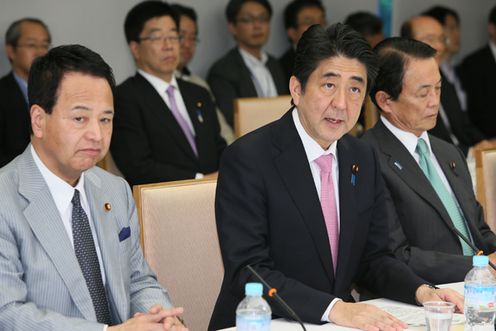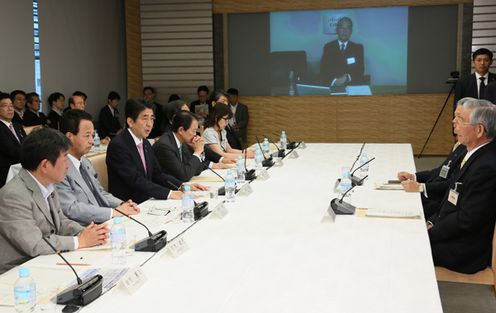Home > News > The Prime Minister in Action > May 2014 > Thematic Meeting of the Industrial Competitiveness Council
Thematic Meeting of the Industrial Competitiveness Council
Wednesday, May 28, 2014

Photograph of the Prime Minister delivering an address (1)

Photograph of the Prime Minister delivering an address (2)
Prime Minister Shinzo Abe held the fourth Thematic Meeting of the Industrial Competitiveness Council at the Prime Minister's Office.
During the meeting, discussion took place on the facilitation of women's active role, as well as the workforce and the ways that people work.
Based on the discussion in the meeting, the Prime Minister said,
“Given the constraints on the number of workers in Japan, I believe that the success or failure of our Growth Strategy will hinge upon whether we can draw out the ambition and capabilities of the Japanese people to the greatest extent possible and achieve highly productive ways of working.
At the same time, in the midst of the rapid advancement of the declining birthrate and aging population, the question of how we strike a balance between issues like childrearing or nursing care on the one hand, and work on the other, is a matter of great significance. I believe that we must change the mindset of society.
To that end, it is crucial that we increase the number of options related to ways of working so that workers have the flexibility to choose a work style that is best suited to their own situation, thereby allowing them to make the most of their talents.
For this reason, we must establish new options related to the system for working hours that are appropriate for free ways of working, which are evaluated based on results.
There is some misunderstanding about the new options, including that they will force people to work long hours or that they will eliminate overtime pay, leading to lower wages. Such things must not occur.
A first prerequisite to our reforms is the fleshing out of initiatives to strengthen legal compliance in order to prevent overworking.
Therefore, the new options:
1. Shall not be applied to people who do not want them;
2. Shall target only human resources with a clear scope of duties and high levels of expertise; and
3. Shall ensure appropriate treatment such that no one experiences a drop in wages due to the way of working they select.
I would like for your discussion to be based on these three preconditions.
Outside of the limited group of people I just mentioned, I would like general workers, for whom time-based evaluation is appropriate, to continue to work hard under the current system for working hours.
At the same time, we will also carry out a bold revision of the flextime system to meet the needs of workers who also have to address a variety of other situations, including childrearing and nursing care.
In addition, in order to foster an environment where employers and workers can create and select workplaces in which they both feel peace of mind, I would like you to discuss systems for labor conflict resolution that have sufficient objectivity and foresight relative to other developed countries.
In relation to the aforementioned points, I would like the relevant ministers to further advance coordination and set out a direction in the revision of the Growth Strategy.
Furthermore, toward the further promotion of the active role of women, I believe we should create a council to serve as a forum for comprehensive discussion on the tax system, the social security system, and spouse allowance. While building on the discussion in that council, I would like the relevant ministers to further advance consideration on a neutral system for different ways of working for women.”

